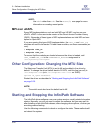
5 – Software Installation
Rebuilding or Reinstalling Drivers After a Kernel Upgrade
5-28 IB0056101-00 G
S
An equivalent way to restart infinipath this is to use same sequence as above,
except use the restart command instead of start and stop:
# /etc/init.d/opensmd stop
# ifdown eth2
# /etc/init.d/infinipath restart
# ifup eth2
# /etc/init.d/opensmd start
You can check to see if opensmd is running by using the following command; if
there is no output, opensmd is not configured to run:
# /sbin/chkconfig --list opensmd | grep -w on
You can check to see if ipath_ether is running by using the following command.
If it prints no output, it is not running.
$ /sbin/lsmod | grep ipath_ether
If there is output, look at the output from this command to determine if it is
configured:
$ /sbin/ifconfig -a
When you need to determine which InfiniPath and OpenFabrics modules are
running, use the following command:
$ lsmod | egrep ’ipath_|ib_|rdma_|findex’
Rebuilding or Reinstalling Drivers After a Kernel
Upgrade
If you upgrade the kernel, then you must reboot and then rebuild or reinstall the
InfiniPath kernel modules (drivers).
To rebuild the drivers, do the following (as root):
# cd /usr/src/infinipath/drivers
# ./make-install.sh
# /etc/init.d/infinipath restart
To reinstall the InfiniPath kernel modules, do the following (as root):
# rpm -U --replacepkgs infinipath-kernel-*
# /etc/init.d/infinipath restart
NOTE:
Stopping or restarting InfiniPath terminates any QLogic MPI processes, as
well as any OpenFabrics processes that are running at the time. Processes
using networking over
ipath_ether will return errors.


















